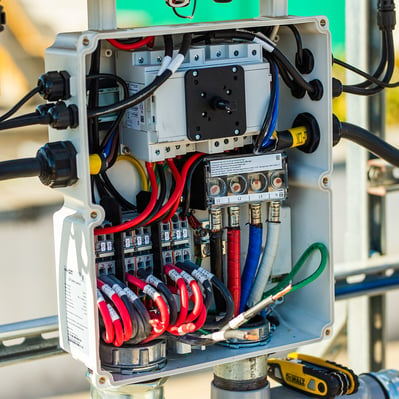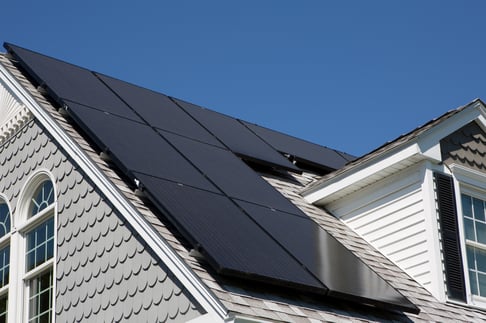Solar Cells and Inverters: An Overview
Considering solar? It's helpful to understand the components that make up the whole. One key part is the solar inverter. Inverters convert the sun's energy into usable power for your home.
In this post, we'll cover the role of inverters in solar panels. We'll review:
- Different types of inverters and how they differ
- Why solar cells need inverters
- Inverter basics like lifespan and performance warnings
- What to consider when shopping for an inverter
Let’s start by exploring what an inverter is.
What Is An Inverter?
An inverter is a key piece of equipment in any solar energy system. Inverters convert the direct current (DC) electricity produced by your solar panels into alternating current (AC) electricity. This conversion is crucial because most homes and appliances operate on AC power, not the DC power generated by solar panels.
The technology that enables solar panels to produce power can't produce AC electricity. As such, without an inverter, the energy harnessed by solar panels would be unusable for everyday appliances.
Modern inverters now provide more than just a conversion from DC to AC. Modern inverters can typically report on energy production, identify issues, and improve safety.
Next, let's explore how these inverters work to make solar energy a viable option for powering your home.
How Do Inverters Work?
Inverters convert direct current (DC) into alternating current (AC) by switching the input of the DC back and forth rapidly. They also use filters and mechanisms to reduce voltage variability and produce a clean, consistent, alternating current.
Different Types of Inverters for Solar
Different Types of Inverters for Solar
There are several types of inverters, each with unique features and benefits. Let's look at three common types: String Inverters, Optimized String Inverters, and Microinverters.
String Inverters
- Overview: String inverters are the most traditional and widely used solar inverter. With string inverters, solar panels are connected in a series, forming one or more 'strings,' which is are then connected to a single inverter.
- Advantages: They are cost-effective and have a straightforward installation process.
- Considerations: One limitation is that if one panel underperforms (due to shading or damage), it can affect the performance of the entire string. This is often compared to older Christmas lights, where if one light failed, all the lights down the string did, too. When selecting an inverter, it's important to choose the appropriate size to accommodate future panel additions and ensure your system can handle the increased capacity.
Power Optimizers
- Overview: These are an advanced version of string inverters. Each panel is connected to an optimizer, which then feeds into the string inverter.
- Advantages: This setup ensures that each panel operates at its greatest potential, even if others are shaded, to improve efficiency.
- Considerations: This type is typically more expensive than traditional string inverters, but they offer better performance and monitoring capabilities.
Microinverters
- Overview: Microinverters are small inverters installed on the back of each solar panel. They convert DC to AC right at the panel before feeding it into the home’s electrical system.
- Advantages: This setup maximizes the output of each panel, as each one operates independently. It's highly efficient, even in varied shading conditions and roof pitches. Another benefit is that microinverters allow you to easily expand your system in the future if your energy needs change.
- Considerations: Microinverters are typically more expensive than string inverters. But offer superior performance and easier troubleshooting.
Each inverter type has its own set of advantages and is suited to different kinds of solar installations. Understanding these can help you decide which is best for your specific needs.
Do Solar Panels Work Without an Inverter?
Solar panels can generate electricity without an inverter, but the key question is about the usability of that power. Solar panels produce direct current (DC) electricity. But your home and appliances use alternating current (AC). Without an inverter, the DC electricity from solar panels is not compatible with these systems. This is similar to the type of gas your car uses. If your car uses standard gasoline, diesel gasoline will not work. This doesn't mean diesel gas doesn't work–it just doesn't work for your car.
So, while solar panels do produce power without an inverter, they don't make power useful to you.
How Much Power Does My Inverter Use?
Converting DC to AC does use some power. However, the power usage is relatively minimal compared to the overall energy production. Inverters are designed to be efficient and only use a small portion of the electricity generated by your solar panels.
- Standby Power: Inverters consume power while they operate, known as standby power. This is typically a small fraction of your system's output.
- Efficiency Ratings: Most modern inverters have high-efficiency ratings ranging from 95% to 98%. This means only a small percentage of solar energy is lost during conversion.
What to Consider When Choosing an Inverter
When selecting an inverter for your solar system, several key factors should be considered to ensure you get the most suitable one for your needs. Here’s what to look for:
- Compatibility with Your Solar Panels: Ensure the inverter can handle the output from your solar panels.
- Efficiency Rating: Higher efficiency means more of your solar energy is converted into usable power.
- System Size and Scalability: Consider if you might expand your solar system in the future.
- Type of Inverter: Decide between string inverters, optimized string, or microinverters inverters based on your specific requirements.
- Warranty and Brand Reputation: Choose a reliable brand with a strong warranty for peace of mind.
Understanding these aspects will help you make an informed decision, to make sure your solar system operates at peak efficiency.
How Long Do Inverters Last?
The lifespan of a solar inverter is an important consideration in the overall durability of your solar energy system. Depending on the type, solar inverters can last from 10 to 25 years. While standard string inverters typically come with a warranty of 10 years, some manufacturers, such as Enphase, offer microinverters with a 25-year warranty. However, even with these longer warranties, the lifespan of inverters is generally shorter than that of solar panels, meaning you might need to replace the inverter during the lifespan of your solar system.
How Do I Know If My Inverter Is Working Properly?
Monitoring your inverter is key to ensuring your solar system is functioning optimally. Here are signs that your inverter is working properly:
- Consistent Power Output: The inverter should consistently convert solar energy without significant fluctuations.

- Energy Production Data & Error Signals: Many modern inverters provide data on energy production that can be monitored on an app or website for unusual patterns.
- Electricity Bills: Check and monitor your monthly solar credits on your electricity bills. If you see something unusual, that could be a sign that your inverter(s) isn’t working correctly.
Contact the Experts at Citadel
Embarking on your solar journey or upgrading your existing system can be filled with questions, especially about the right inverter for your needs. The experts at Citadel Roofing & Solar are here to guide you through every step. With our extensive knowledge and experience in solar technology, we can help you choose the perfect inverter that suits your specific requirements and maximizes your solar investment. Contact us today to see how we can help you harness the power of the sun.



